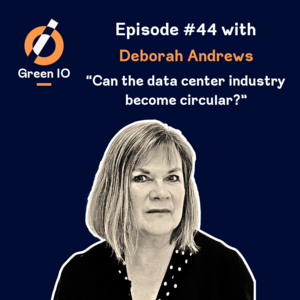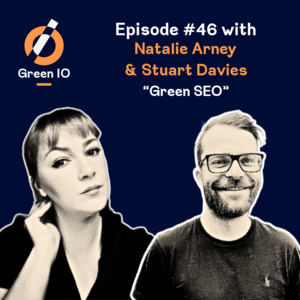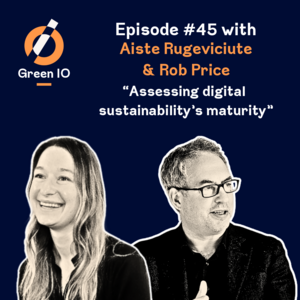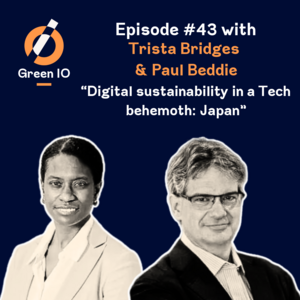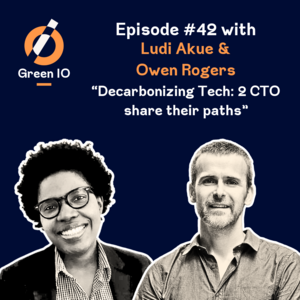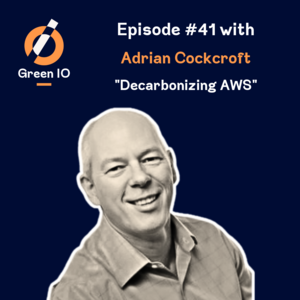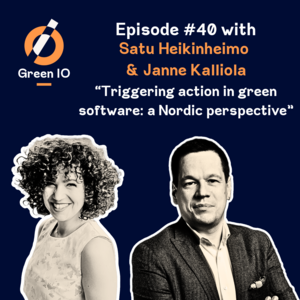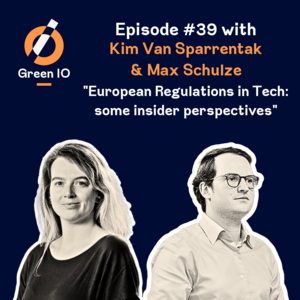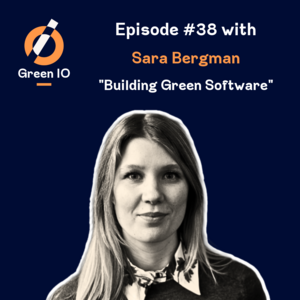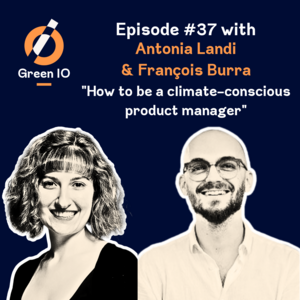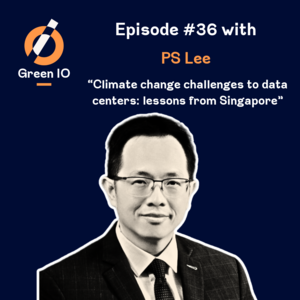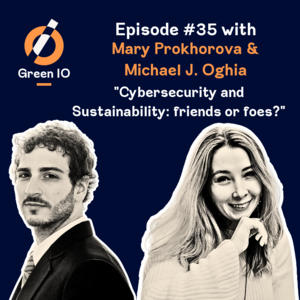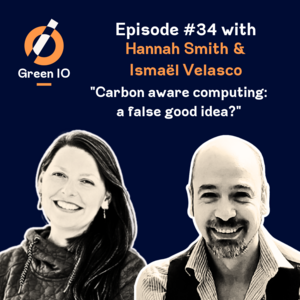#44 - Can the data center industry become circular? with Deborah Andrews
Update: 2024-09-03
Description
💭Fueled by the ongoing artificial intelligence boom, data centers are popping up around the world like mushrooms after a good rain raising serious sustainability concerns. Hence a pressing question: can the data center industry become circular?
🎙️To get some answers, Gaël Duez welcomes a veteran in Circular Economy and Life Cycle Sustainability Assessment, Prof. Deborah Andrews, from London South Bank University, the founder and academic lead for CEDaCI.
🎙️To get some answers, Gaël Duez welcomes a veteran in Circular Economy and Life Cycle Sustainability Assessment, Prof. Deborah Andrews, from London South Bank University, the founder and academic lead for CEDaCI.
Some Takeaways:
💡 how the CEDaCI Compass tool can help data center being equipped more sustainably,
♻️ current inadequacies in recycling infrastructure for electronic waste, and
⚡ concerns about the rapid development of AI and its energy demands
❤️ Subscribe, follow, like, ... stay connected the way you want to never miss our episode, every two Tuesday!
📧 Once a month, you get carefully curated news on digital sustainability packed with exclusive Green IO contents, subscribe to the Green IO newsletter here.
📣 Green IO London is on September 19th 2024 --> use the voucher GREENIOVIP to get a free ticket!
Learn more about our guest and connect:
📧 You can also send us an email at contact@greenio.com to share your feedback and suggest future guests or topics.
Deborah's sources and other references mentioned in this episode:
- CEDaCI Project
- CEDaCI Compass
- Investment in clean energy this year is set to be twice the amount going to fossil fuels
- Deforestation-free supply chains
- Life Cycle Assessment (LCA) – Everything you need to know
- Tantalum is mined in Central Africa, mainly in DRC
- Interreg NWE
- European Regional Development Fund
Transcript
Intro 00:00
There's a real need to shift thinking and business models and possibly, rather than selling it, equipment actually to sell services. So companies own equipment, so then they're responsible for maintenance and for what happens, either for extending life, which would be very much to their advantage, or for recycling, ending life.
Gael Duez 00:37
Hello everyone, welcome to Green IO with Gael Duez - that’s me! In this podcast we empower responsible technologists to build a greener digital world, one byte at a time. Twice a month on a Tuesday, our guests from across the globe share insights, tools, and alternative approaches, enabling people within the Tech sector and beyond, to boost Digital Sustainability.
And because accessible and transparent information is in the DNA of Green IO, all the references mentioned in this episode, as well as the transcript, will be in the show notes. You can find these notes on your favorite podcast platform, and, of course, on our website greenio.tech.
Can the data center industry become circular? Simple question, very complex answers.
Fueled by the ongoing artificial intelligence boom, data centers are popping up around the world like mushrooms after a good rain. For an industry which is more and more under scrutiny due to its environmental footprint, the sustainability angle cannot be overlooked anymore. Still, the main hurdle remains data, as many guests already stated in this podcast. Hence, my wish today to get insights from the program leader of an initiative which has managed to build high quality primary data on the data center industry. The CEDaCI project sounds like a Dan Brown book title, CEDaCI code to unveil all the mysterious power beneath our almighty data center industry. And to some extent, it's quite the plot. But I will let Deborah Andrews, Professor at London South Bank University and a two decades long veteran in Circular Economy and Life Cycle Sustainability Assessment reveal all of it.
Hi, Deborah. Thanks a lot for joining Green IO today.
Deborah Andrews 02:32
Thank you very much for inviting me.
Gael Duez 02:35
It's a pleasure. It's a pleasure. And I have a very direct question to ask you to kick start our discussion. Did you start the CEDaCI project out of frustration somehow?
Deborah Andrews 02:49
Okay, well, first of all, thank you for calling CEDaCI. That's the Italian interpretation. We normally describe it as CEDaCI, but hey ho, it's an acronym for the Circular Economy for the Data Center Industry. And yes, there was an element of frustration. I had worked with researchers and operators and so forth in the data center industry on a number of research projects from about 2010, 2012, and was acutely aware that the sector was very fragmented. There was the most phenomenal amount of expertise in the sector, but people worked in silos and didn't connect with each other. And consequently, there wasn't a sort of whole systems approach to the challenge of sustainability. And the industry experts in each of the sectors were doing the best that they could for their particular sub sector, but there was no consideration of the impact that those actions had in their sector. What the impact on other parts of the industry were? So it was absolutely apparent that there was a need for a whole systems approach. And it was very timely in, you know, having spoken to people who subsequently became partners in the project, that they were also acutely aware of this challenge. But being in academia, I was very lucky, being sort of slightly outside the industry, to be able to bring various representatives, stakeholders, etcetera, from the sub sectors together without having any bias.
Gael Duez 04:38
And Deborah just could you illustrate, maybe with a few examples, what silos are you referring to?
Deborah Andrews 04:45
So, one of the first things that we did in the project was to carry out a very critical appraisal of the state of the art. In other words, we did a scoping review of what was going on in the industry, and we identified eleven key sub sectors, key players within the industry, starting with suppliers and then going through design, manufacturing, etcetera. But what we did was linked the silos, or found evidence that these silos actually were related to all the different lifecycle stages of data center equipment.
Now, we focused on electrical and electronic equipment, because based on prior studies with a very extensive PhD that we ran in conjunction with HP, we found that the hotspot, if you like, the environmental hotspot, and this was looking at a whole data center. So the building or the services, M&E, etcetera. The key area of environmental impact was IT equipment, partly because of the embodied materials, the energy consumption, but also the short life of products, and in particular of servers. We found that they have ordered center equipment, and this was also reflected in a big EU report that informed lot nine that servers had the highest environmental impact. So that was the focus of the CEDaCI project. But coming back to the life cycle stages and so forth, and the various silos, then we have the installation phase. And use, of course, is incredibly important. Operational energy transport, taking stuff to and from data centers, perhaps taking to secondary market operators or recycling plants. Then we have data destruction, which could be through mechanical means, shredding, etcetera, or it could be more digital with software. And then ultimately we move on to the end of life. And we could say end of first Life, which leads to secondary market and reuse. This includes refurbishment and remanufacture. Ultimately, though, whether you send your equipment to secondary market suppliers or straight on for recycling, eventually all equipment ends up with end of life processes.
Now, ideally as much of the product should be recycled as possible. But what tends to happen is that the low hanging fruit, things like the casings and so forth, as their steel and obviously external, those recycled and the majority of the PCBs aren't, they end up in landfill. There's a real need for a shift in thinking practice to manage end of life equipment. In this CEDaCI project, one of the key things, one of our USPs, was to bring together representatives, stakeholders from these various subsectors. But one of the points that came up, because we organized co-creation workshops as part of the project, to identify what stakeholders felt they wanted, whether what they wanted was in line with what we felt would benefit them, which was a tool to aid decision making about to help with the sustainability profiling companies and so forth. But one of the USPs brought together these people, and then invariably they commented how much they had learned through the co-creation workshops, because they didn't talk to people who worked in other sub sectors. So this, aga
There's a real need to shift thinking and business models and possibly, rather than selling it, equipment actually to sell services. So companies own equipment, so then they're responsible for maintenance and for what happens, either for extending life, which would be very much to their advantage, or for recycling, ending life.
Gael Duez 00:37
Hello everyone, welcome to Green IO with Gael Duez - that’s me! In this podcast we empower responsible technologists to build a greener digital world, one byte at a time. Twice a month on a Tuesday, our guests from across the globe share insights, tools, and alternative approaches, enabling people within the Tech sector and beyond, to boost Digital Sustainability.
And because accessible and transparent information is in the DNA of Green IO, all the references mentioned in this episode, as well as the transcript, will be in the show notes. You can find these notes on your favorite podcast platform, and, of course, on our website greenio.tech.
Can the data center industry become circular? Simple question, very complex answers.
Fueled by the ongoing artificial intelligence boom, data centers are popping up around the world like mushrooms after a good rain. For an industry which is more and more under scrutiny due to its environmental footprint, the sustainability angle cannot be overlooked anymore. Still, the main hurdle remains data, as many guests already stated in this podcast. Hence, my wish today to get insights from the program leader of an initiative which has managed to build high quality primary data on the data center industry. The CEDaCI project sounds like a Dan Brown book title, CEDaCI code to unveil all the mysterious power beneath our almighty data center industry. And to some extent, it's quite the plot. But I will let Deborah Andrews, Professor at London South Bank University and a two decades long veteran in Circular Economy and Life Cycle Sustainability Assessment reveal all of it.
Hi, Deborah. Thanks a lot for joining Green IO today.
Deborah Andrews 02:32
Thank you very much for inviting me.
Gael Duez 02:35
It's a pleasure. It's a pleasure. And I have a very direct question to ask you to kick start our discussion. Did you start the CEDaCI project out of frustration somehow?
Deborah Andrews 02:49
Okay, well, first of all, thank you for calling CEDaCI. That's the Italian interpretation. We normally describe it as CEDaCI, but hey ho, it's an acronym for the Circular Economy for the Data Center Industry. And yes, there was an element of frustration. I had worked with researchers and operators and so forth in the data center industry on a number of research projects from about 2010, 2012, and was acutely aware that the sector was very fragmented. There was the most phenomenal amount of expertise in the sector, but people worked in silos and didn't connect with each other. And consequently, there wasn't a sort of whole systems approach to the challenge of sustainability. And the industry experts in each of the sectors were doing the best that they could for their particular sub sector, but there was no consideration of the impact that those actions had in their sector. What the impact on other parts of the industry were? So it was absolutely apparent that there was a need for a whole systems approach. And it was very timely in, you know, having spoken to people who subsequently became partners in the project, that they were also acutely aware of this challenge. But being in academia, I was very lucky, being sort of slightly outside the industry, to be able to bring various representatives, stakeholders, etcetera, from the sub sectors together without having any bias.
Gael Duez 04:38
And Deborah just could you illustrate, maybe with a few examples, what silos are you referring to?
Deborah Andrews 04:45
So, one of the first things that we did in the project was to carry out a very critical appraisal of the state of the art. In other words, we did a scoping review of what was going on in the industry, and we identified eleven key sub sectors, key players within the industry, starting with suppliers and then going through design, manufacturing, etcetera. But what we did was linked the silos, or found evidence that these silos actually were related to all the different lifecycle stages of data center equipment.
Now, we focused on electrical and electronic equipment, because based on prior studies with a very extensive PhD that we ran in conjunction with HP, we found that the hotspot, if you like, the environmental hotspot, and this was looking at a whole data center. So the building or the services, M&E, etcetera. The key area of environmental impact was IT equipment, partly because of the embodied materials, the energy consumption, but also the short life of products, and in particular of servers. We found that they have ordered center equipment, and this was also reflected in a big EU report that informed lot nine that servers had the highest environmental impact. So that was the focus of the CEDaCI project. But coming back to the life cycle stages and so forth, and the various silos, then we have the installation phase. And use, of course, is incredibly important. Operational energy transport, taking stuff to and from data centers, perhaps taking to secondary market operators or recycling plants. Then we have data destruction, which could be through mechanical means, shredding, etcetera, or it could be more digital with software. And then ultimately we move on to the end of life. And we could say end of first Life, which leads to secondary market and reuse. This includes refurbishment and remanufacture. Ultimately, though, whether you send your equipment to secondary market suppliers or straight on for recycling, eventually all equipment ends up with end of life processes.
Now, ideally as much of the product should be recycled as possible. But what tends to happen is that the low hanging fruit, things like the casings and so forth, as their steel and obviously external, those recycled and the majority of the PCBs aren't, they end up in landfill. There's a real need for a shift in thinking practice to manage end of life equipment. In this CEDaCI project, one of the key things, one of our USPs, was to bring together representatives, stakeholders from these various subsectors. But one of the points that came up, because we organized co-creation workshops as part of the project, to identify what stakeholders felt they wanted, whether what they wanted was in line with what we felt would benefit them, which was a tool to aid decision making about to help with the sustainability profiling companies and so forth. But one of the USPs brought together these people, and then invariably they commented how much they had learned through the co-creation workshops, because they didn't talk to people who worked in other sub sectors. So this, aga
Comments
Top Podcasts
The Best New Comedy Podcast Right Now – June 2024The Best News Podcast Right Now – June 2024The Best New Business Podcast Right Now – June 2024The Best New Sports Podcast Right Now – June 2024The Best New True Crime Podcast Right Now – June 2024The Best New Joe Rogan Experience Podcast Right Now – June 20The Best New Dan Bongino Show Podcast Right Now – June 20The Best New Mark Levin Podcast – June 2024
In Channel

